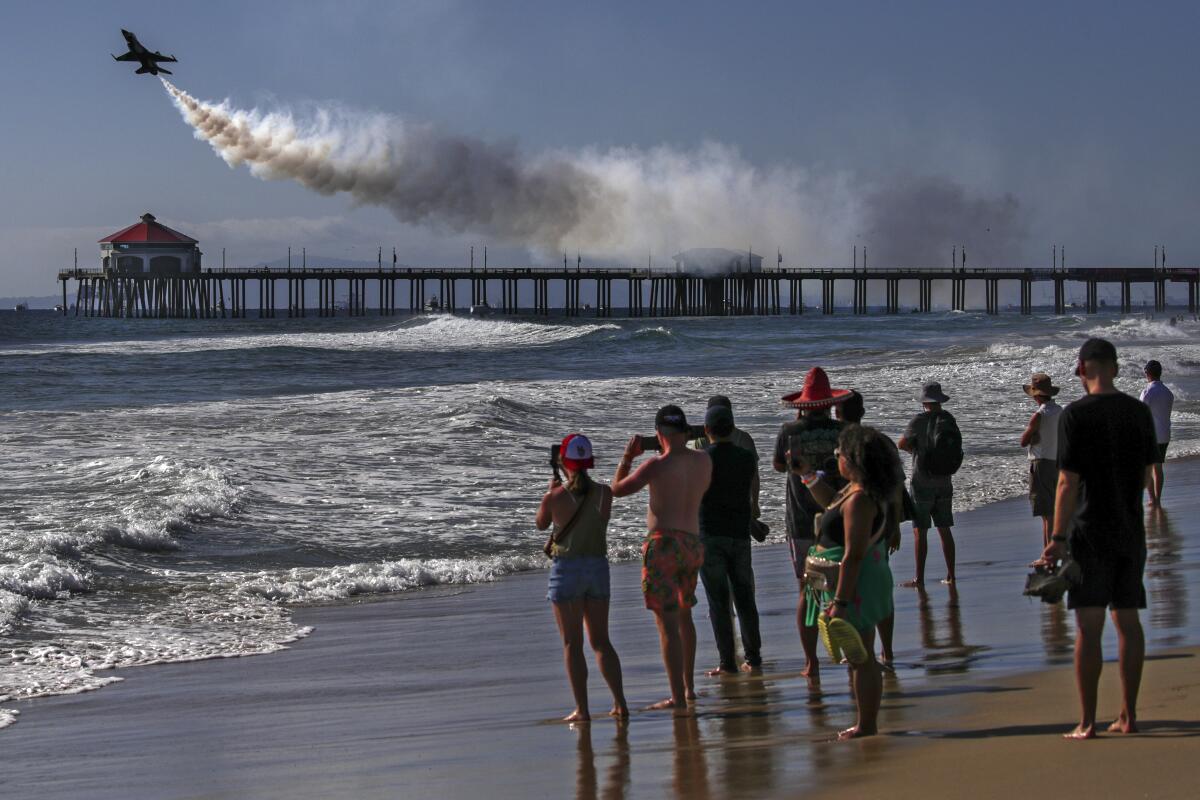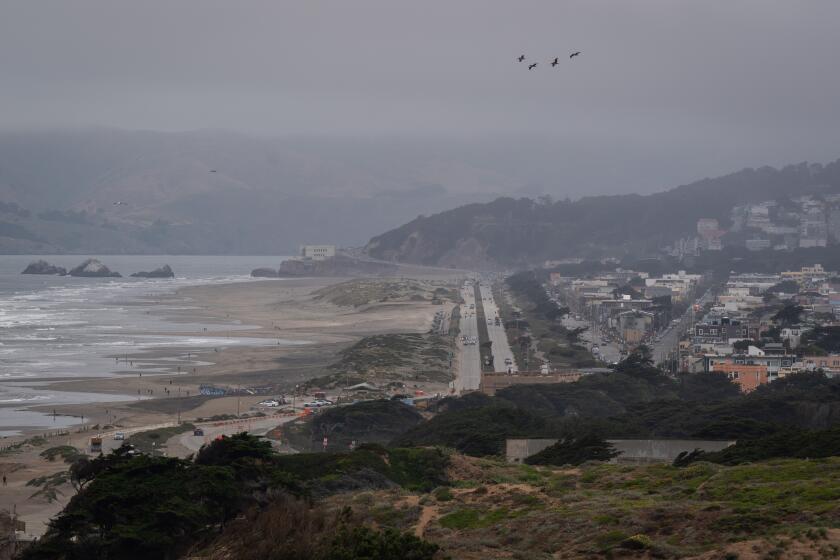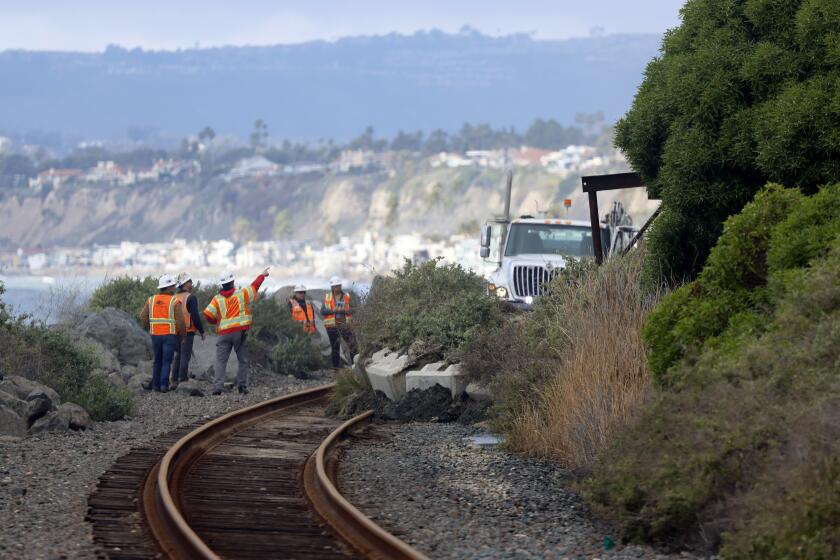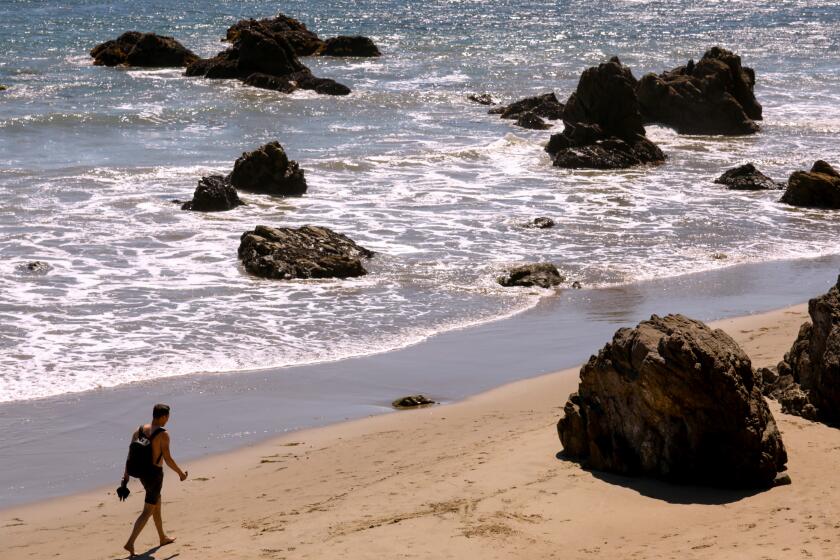Editorial: Huntington Beach’s deals with Pacific Airshow stiff the public one way or another

- Share via
There’s no question that the annual Pacific Airshow in Huntington Beach is popular. For three days in early fall, military and civilian planes put on an aerobatic display over roughly a mile of oceanfront for nearly 700,000spectators.
Fans flock to the show, and this year they will pay the event organizers $30 to just plant themselves on the sand or up to $80 to sit on the pier. Tickets for seating and food and drink under a tented pavilion can cost a few hundred — or thousands if it’s a reserved table for 10. RV parking spots next to the beach for four nights can go for $4,500. It’s a fun time for paying customers, and a lucrative gig for the event management company, Code Four, which has owned and operated the air show since 2016.
The problem is that the roughly mile-long stretch of beach where the event takes place is public land, which isn’t supposed to be cut off completely from free public access. Yet, that is happening, the state Coastal Commission has repeatedly warned city officials and the air show operator. Last year, for example, the show organizers erected a fence around the entire three-day event, ostensibly, to keep the non-paying public out. Non-payers were also kept off the pier and out of the water.
California’s need for housing doesn’t require unraveling a legacy of balancing access, preservation and development at the beach.
That’s unacceptable. California law requires public access to beaches, and it’s the responsibility of the Coastal Commission to ensure, through the permitting process, that events such as the air show provide it. But commission officials say Code Four never bothered to apply for the coastal permits required to put up equipment and structures or take nearby public parking spaces out of use for nearly a month.
Of course Code Four needs to obtain the required permits, and the city of Huntington Beach should insist it does. The city says the show does provide some free access and that it’s the Federal Aviation Administration that cuts off water access. If so, all that needs to be explained in a permit application.
Another landslide in San Clemente has closed the tracks to passenger trains. Officials need a long-term plan to move this important service to stable ground away from the ocean’s edge.
But a troubling settlement struck by the city last year — the full terms of which were kept secret until recently — shows the city is too willing to give all sorts of benefits to the Pacific Airshow. The deal settles Code Four’s lawsuit over a 2021 coastal oil spill that caused the city to cancel the final day of the air show, and gives the operator millions of dollars in taxpayer funds and the exclusive right to stage the event for up to 40 years.
The city agreed to pay the show operators nearly $5 million, plus up to $2 million more depending on what the city might get from pending litigation against the company that owns the pipeline that leaked. Additionally, the city waives various fees and offers the use of 3,500 city parking spots to monetize during the show — 600 of which the organizers can use for nearly a month setting up equipment before the show and taking it down. The settlement’s terms on parking spots and length of time the show would operate don’t go into effect until there is a signed contract approved by the City Council.
Instead of working out a plan to help visitors find beaches, Malibu and a local agency are locked in a standoff over directional signs to Lechuza Beach that the city say didn’t have the proper permits.
The arrangement stinks, and Atty. Gen. Rob Bonta should investigate, as three current Huntington Beach City Council members have requested. Councilman Dan Kalmick called it an egregious “gift of public funds.” State Sen. Dave Min (D-Irvine) also called for a state audit.
What could possess a city to enter such a breathtaking settlement for making a decision to protect public safety? The city attorney says the city was legally vulnerable because the decision to cancel was made without first calling an emergency meeting of the City Council. Huntington Beach City Councilmember Tony Strickland, who was mayor at the time of the settlement, says the air show brings in revenue of $120 million to Huntington Beach and if it hadn’t settled, Kevin Elliott, the chief executive of Code Four, would have taken the show to another beach city.
If he’s right, that makes it all the more important that state officials examine public giveaways like this so that cities aren’t pressured to make sketchy deals.
We want events such as the Pacific Airshow to continue to thrive — so long as they don’t hold up a city for excessive perks or violate California’s historic guarantee of public access to its magnificent beaches.
More to Read
A cure for the common opinion
Get thought-provoking perspectives with our weekly newsletter.
You may occasionally receive promotional content from the Los Angeles Times.













